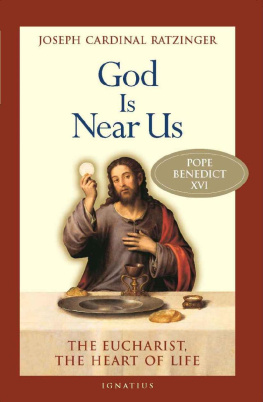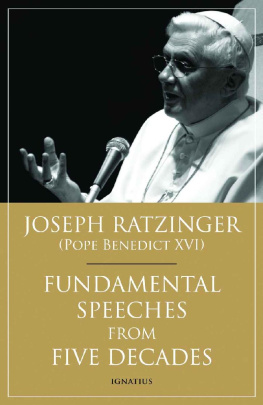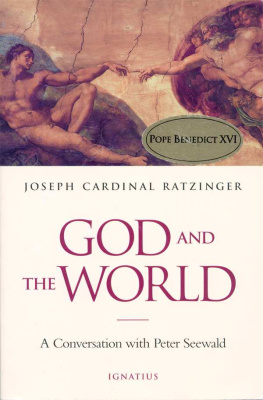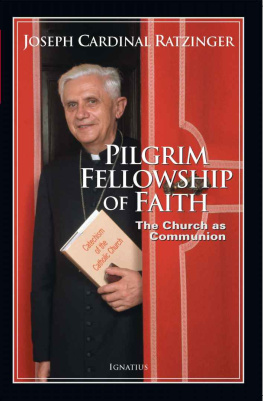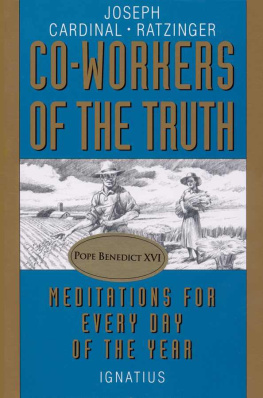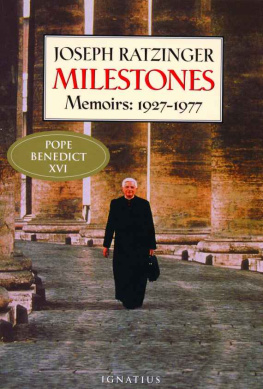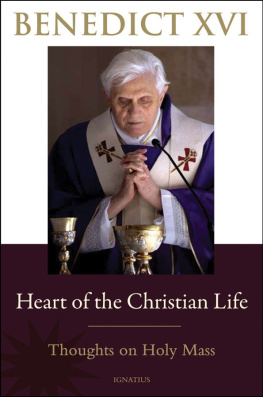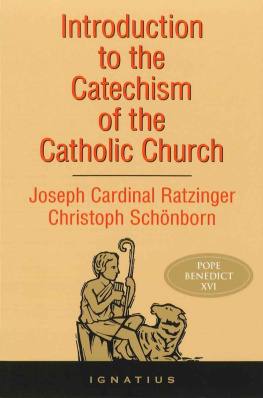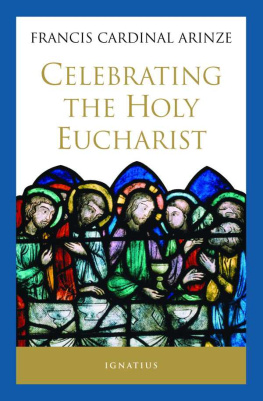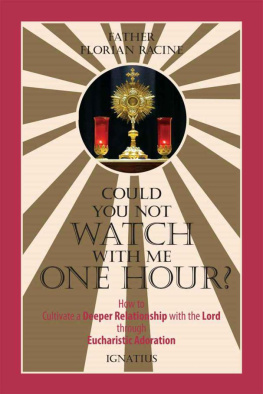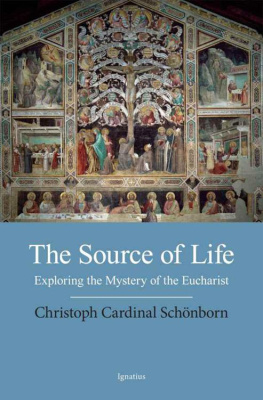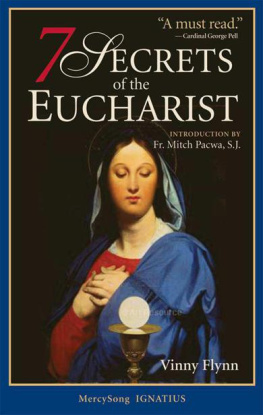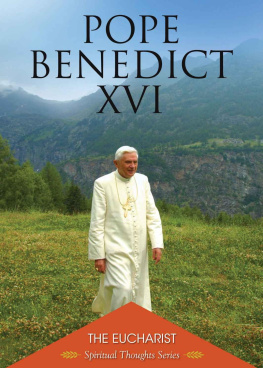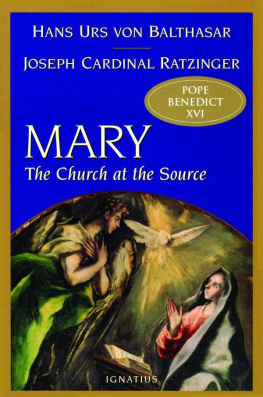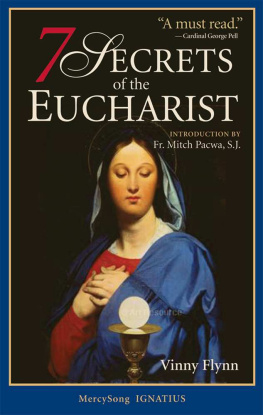GOD IS NEAR US
JOSEPH CARDINAL RATZINGER
GOD IS NEAR US
The Eucharist, the Heart of Life
Edited by
Stephan Otto Horn and Vinzenz Pfnr
Translated by
Henry Taylor
IGNATIUS PRESS SAN FRANCISCO
Title of the German original:
Gott ist uns nah. Eucharistie: Mitte des Lebens
2001 Sankt Ulrich Verlag, Augsburg
Cover art:
Juan de Juanes (1510-1588)
The Last Supper (detail)
Museo del Prado, Madrid, Spain
Scala / Art Resource, New York
Cover design by Roxanne Mei Lum
2003 Ignatius Press, San Francisco
All rights reserved
ISBN 978-0-89870-962-9
Library of Congress Control Number 2003103053
Printed in the United States of America
Contents
By the Power of the Holy Spirit He Was Born of the Virgin Mary, and Became Man
The Origin of the Eucharist in the Paschal Mystery
The Eucharist: Heart of the Church
The Proper Celebration of the Holy Eucharist
The Real Presence of Christ in the Eucharistic Sacrament
On the Question of the Adoration of the Eucharist and Its Sacredness
A Homily on Deuteronomy 4:7
Celebrating Corpus Christi
The Eucharist and the Church
Peace as One of the Names of the Eucharistic Sacrament
Celebrating in Communion with the Pope
A Homily on Acts 2:42
On the Christian Belief in Eternal Life
Introduction
From the beginning, the Eucharist has held a special place in the theology of Joseph Ratzinger. In particular, it has been determinative for his understanding of the Church. The Church originates, and has her continuing existence, in the Lords communicating himself to men, entering into communion with them, and thus bringing them into communion with one another. The Church is the Lords communion with us, which at the same time brings about the true communication of men with one another. As the epigraph for his dissertation, People of God and House of God in Augustines Doctrine of the Church , Joseph Ratzinger had already chosen: Unus panis unum corpus sumus multi We who are many are one body, for we all partake of the one bread.
Looking at this understanding of Eucharist and Church, we see a continuous and unbroken line of development from the time before the Council up to the present day, as Joseph Ratzingers publications and addresses bear witness. This eucharistic ecclesiology even found its way into the texts of the Council.
The great value he places on traditional eucharistic piety, expressed in processions, devotional services, silent adoration before the Holy Sacramentsomething to be found in this present volume, as elsewhereis not, in the case of Joseph Ratzinger, an unexamined survival from the time before the Council. It is rather the case that the significance of these forms of piety, as expressing a personal communication with Christ, has gradually unfolded for him with the passage of time.
Communion presupposes an understanding of God in which the Absolute Being is not an impersonal universal law; rather, he is word, meaning, and love, living fellowship. So what is here expounded concerning the Eucharist is set within a framework of two pieces that illuminate a wider horizon: God the Trinity comes to meet us, becomes a God who is with us and among us, and this implies at the same time that at the end we do not just pass on into emptiness but find everlasting happiness in Gods presence.
The great majority of the pieces on the theme of the Eucharist that have been brought together here are transcripts of tape-recorded sermons delivered in particular situations and for special occasions. We have deliberately retained this flavor of the spoken word. Nonetheless, we see the texts we have chosen as giving a new and significant impulse toward a more profound understanding of the mystery of Gods intimate presence in the Eucharist.
We would like first of all to thank the author for having tirelessly, and with a commitment often extending to the limit of what is humanly possible, put himself in the service of communicating and unfolding for people the message of the Christian faith.
We would further like to thank the public relations office of the archdiocese of Munich for its friendly help in letting us see the sermons that Joseph Cardinal Ratzinger preached during his time at Munich and also Herr Helmuth Brandner for his ready help and support.
Our thanks are due to the publisher Erich Wewel Verlag for permission to reprint the four sermons published in 1978 under the title EucharistieMitte der Kirche (EucharistHeart of the Church).
Not least we would like to thank the Saint Ulrich Verlag, at whose initiative this present little book was produced. Our thanks are especially due to the editor, Michael Widmann, who made available an extensive collection of sermons by Cardinal Ratzinger and who took responsibility for getting the book ready for print, and likewise to Anja Beck for her committed work in typesetting and layout.
The Editors
God with Us
and God among Us
By the power of the Holy Spirit
He was born of the Virgin Mary, and became Man
Like all the great creeds of the early Church, the Nicene Creed has the basic structure of a profession of faith in the triune God. Its essential character is that of saying Yes to the living God as our Lord, the God from whom we have life and to whom our life returns. It is a declaration of faith in God. But what does it mean when we call this God a living God? It means that this God is not a conclusion we have reached by thinking, which we now offer to others in the certainty of our own perception and understanding; if it were just a matter of that, then this God would never be more than a human idea, and any attempt to turn to him could well be a reaching out in hope and expectation but would still lead us into vagueness. When we talk of the living God, it means: This God shows himself to us; he looks out from eternity into time and puts himself into relationship with us. We cannot define him in whatever way we like. He has defined himself and stands now before us as our Lord, over us and in our midst. This self-revelation of God, by virtue of which he is not our conception but our Lord, rightly stands, therefore, in the center of our Creed: a profession of faith in the story of God in the midst of human history does not constitute an exception to the simplicity of our profession of faith in God but is the essential condition at its heart. That is why the heart of all our creeds is our Yes to Jesus Christ: By the power of the Holy Spirit he was born of the Virgin Mary. We genuflect at this clause, because at this point the heavens, the veil behind which God is secluded, are swept aside, and the mystery touches us directly. The distant God becomes our God, becomes EmmanuelGod with us (Mt 1:23). The great masters of church music have found ever new ways of making this sentence sound out, beyond anything that can be said in words, in such a way that the inexpressible reaches our ears and touches our hearts. Such compositions are an exegesis of the mystery more profound than any of our rational interpretations. But because it was the Word that became flesh, we must ever again strive, nonetheless, to translate into our human words this first creative Word, which was with God and which is God (Jn 1:1), so that in those words we may hear the Word.
1. Grammar and Content in the Sentence from the Creed
If we look at the sentence first of all according to its grammatical structure, we see that it talks about four agents. It makes specific mention of the Holy Spirit and the Virgin Mary. But then there is also the he, of he was born. This he has previously been given various names: Christ, the only Son of God,... true God from true God... , of one Being with the Father. So within this heand indivisible from himthere is contained another Self: the Father, with whom he is of one Being, so that he can be said to be God from God. That means: the first and true agent in this sentence, the subject, isas we could hardly imagine to be otherwise, in view of what we have just recalledGod, but God in three Persons, who yet are but one: the Father, the Son, and the Holy Spirit. But the dramatic feature of this sentence is that it does not assert some eternal truth about the being of God; rather, it expresses an action, which on closer inspection turns out to be in the passive voice, something that happens to him. It is to the action thus described, in which the three Divine Persons all play a part, that the ex Maria virgine refers; indeed, the dramatic aspect of the whole depends on it. For without Mary the entire process of Gods stepping into history would fail of its object, would fail to achieve that very thing which is central in the Creedthat God is a God with us and not just a God in himself and for himself.
Next page
